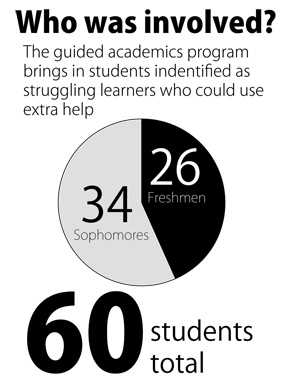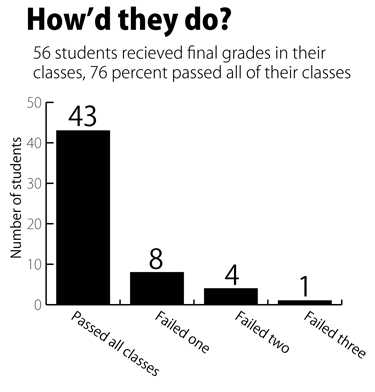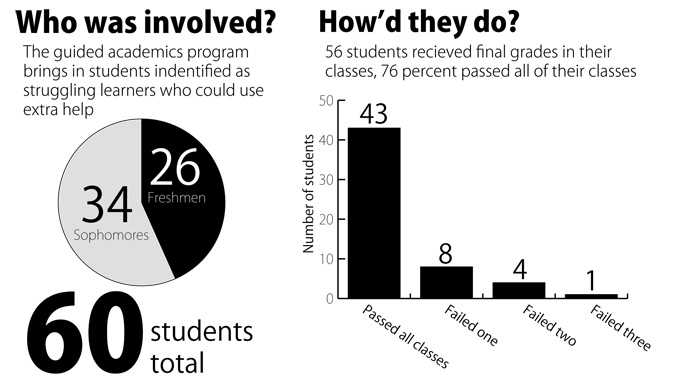Students who were having a tough time academically didn’t have too many resources to help them improve. They might have heard the general critiques or words of encouragement, “study harder,” “give it your best effort,” or may have just wanted to give up. Now that’s all changed.
Guided academics and learning lunch in particular, are two of the more recent programs that have been introduced. They were designed to give kids time during the school day to do homework. Additionally, they can complete missing assignments and get support.
“Those are the two big ones, we are developing some more, but we also have watchlist meetings every Monday, with the whole Student Services team which includes the counselors, me, the school psychologist, the school social worker, both assistant principals and the principal,” the district’s At-Risk Social Worker, Emily Berry said.
Every Monday, the team gets together to look at a list students who are failing two or more classes. They discuss who is going to touch base with them and intervene so that the kids can start passing their courses.
“Basically we’re trying to be more proactive about students who are failing instead of waiting until the end of the trimester,” Berry said. “We’re trying to talk weekly about those kids so they don’t get lost in the shuffle.”
The programs in place for students today have been in the works for a couple of years.
“We listened to a presenter in August 2011, Tim Westerberg, he presents on becoming a great high school- six strategies and one attitude,” principal Tracy Wilson said. “At the end of this professional development, I had our staff vote on these six strategies and tell me what they felt was our biggest weakness as a building. They felt like our biggest weakness was providing timely intervention for struggling students. We immediately began that as our focus of helping o ur most struggling learners.”
ur most struggling learners.”
Teachers Vince Gervais and Aaron Blain, are a large part of the guided academics program. They teach the guided academics classes, which are specifically for freshmen and sophomores. These classes have been in place for a few years, but are being run differently this year.
“It’s the same deal [as learning lunch] where we’re trying to find time during the day when they could complete work that they have,” Gervais, the students at risk coordinator of guided academics said. “If they have questions we’re here to help and get them the support they need. We direct them to the math lab, the history lab. We have a lot of resources available. Part of it is just making students aware of the resources they have and provide them some help if they need it.”
Throughout the past year, there has been noticeable improvement. The numbers on the “F” lists continue to drop. During last trimester, about 200 to 300 students were failing a class per week, and at the end, only 198 kids had failed a course.
Students do not have to fail a class to receive help. Learning lunch was developed so that kids can drop in when necessary, providing them support and a quieter place to work. More and more students have been coming in voluntarily.
Help from the history and math labs (open before and after school and during lunch) is also available. Aside from these, there are reading and writing courses that have been in place for years that learners are recommended to take if they are struggling in English classes.
“We have our reading and writing curriculum and our reading and writing one and two course, [where] students are tested and placed in those courses,” Wilson said. “If a student is adamant that they don’t want to participate in something like that, we can’t force them. We like to give them the opportunities to get help where they need it most.”
With grades continuing to improve, guided academics has shown to be a success amongst the students.
“My grades have improved a lot since I’v e been in guided academics,” sophomore Fortune Anyanwu said. “I used to be a D or F student now I’m a B or C student. There’s a lot of help in there too.”
e been in guided academics,” sophomore Fortune Anyanwu said. “I used to be a D or F student now I’m a B or C student. There’s a lot of help in there too.”
Kids have also been taught helpful study and organizational skills that they can use for the future.
“I used to not study at all, just walk in class and take a test- whatever,” Anyanwu said. “But now I’m actually starting to study and care, and I’m actually understanding stuff. I realized that high school is the road for your future and you basically have to do good in high school to succeed.”
Another important aspect of the guided academics program is for students to establish meaningful relationships with their teachers and other staff members.
“My biggest thing is that I want them to see it as an opportunity, not a punishment,” Gervais said. “[Our goal is to] provide intervention, we don’t want kids to fail classes. A lot of people view help as a weakness, but it’s actually a strength. It’s something that I think is important, we’ve all had help along the way and some people just need a little more help.”


